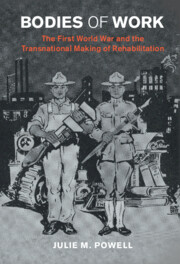Book contents
- Bodies of Work
- Studies in the Social and Cultural History of Modern Warfare
- Bodies of Work
- Copyright page
- Dedication
- Contents
- Figures
- Tables
- Acknowledgements
- Introduction: Whole Nations in Arms
- 1 The Gospel of Rehabilitation
- 2 A Great Army of Industrial Soldiers
- 3 A Duty Incumbent on All Allied People
- 4 He Marches Off On an Entente Leg
- 5 A Charge Almost If Not Quite as Sacred
- Conclusion: The Right to Rehabilitation
- Bibliography
- Index
3 - A Duty Incumbent on All Allied People
Published online by Cambridge University Press: 20 October 2022
- Bodies of Work
- Studies in the Social and Cultural History of Modern Warfare
- Bodies of Work
- Copyright page
- Dedication
- Contents
- Figures
- Tables
- Acknowledgements
- Introduction: Whole Nations in Arms
- 1 The Gospel of Rehabilitation
- 2 A Great Army of Industrial Soldiers
- 3 A Duty Incumbent on All Allied People
- 4 He Marches Off On an Entente Leg
- 5 A Charge Almost If Not Quite as Sacred
- Conclusion: The Right to Rehabilitation
- Bibliography
- Index
Summary
Chapter 3 examines the Permanent Inter-Allied Committee for the War Disabled (PIC), which, from 1917 to 1922, hosted annual conferences, created an institute on the Rue du Bac in Paris for the study and cataloguing of pertinent information, and published the Inter-Allied Review to circulate the results of their efforts. PIC members and affiliates – many of whom were prolific contributors to the Allied culture of rehabilitation – shared a common vocabulary for, and framing of, the work of rehabilitation. They also, by and large, shared an understanding of their role within it, in terms that preserved the social hierarchy through preservation of their masculinity vis-à-vis the working-class soldier. The cooperative space created by the PIC, where government and military officials, social reformers, and medical practitioners came together, encouraged the reimagination of belonging, but whether the soldier and his sacrifice belonged to the nation, the Allies, or to humanity – and therefore whether nations ought to maintain exclusive responsibility for the disabled soldier – was never fully resolved.
- Type
- Chapter
- Information
- Bodies of WorkThe First World War and the Transnational Making of Rehabilitation, pp. 106 - 135Publisher: Cambridge University PressPrint publication year: 2022

